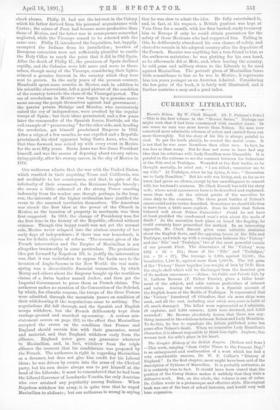CURRENT LITERATURE.
Horatio Nelson. By W. Clark Russell. (G. P. Putnam's Sons.) —This is the first volume in the "Heroes Series," Perhaps one might wish that it had been commenced with another name. In one sense no man was more heroic than Nelson. No man ever conceived more admirable schemes of action and carried them out more thoroughly. Yet the story of his life is always painful to read. To put the truth plainly, he wanted the moral sense. It is not that he was more licentious than other anon. In fact, he was less so than many. But he does not seem to have had any idea that his relations with Lady Hamilton wore blameable. It is painful in the extreme to see the contrast between his behaviour at the Nile and at Trafalgar. Wounded at the first battle, as he thought mortally, he cried out ; " I am killed ; remember me to my wife." At Trafalgar, when he lay dying, it was : " Remember me to Lady Hamilton." But his wife was living, and, as far as wo know, had given no offence, except by her unwillingness to consort with her husband's mistress. Mr, Clark Russell has told the story well; whore naval manoeuvres have to be described and explained, more than well. At the critical points of the narrative he rises duly to the occasion. The three groat battles of Nelson's career could not be better described. Sometimes we should like him to have been a little more explicit. Does he think that Nelson behaved well about Prince Caracciolo P Could he not have at least gratified the condemned man's wish about the mode of death As the execution took place on board the flagship, he could certainly have prescribed the method. In an interesting appendix, Mr. Clark Russell gives some valuable statistics about the English fleets, and the opposing forces at the Nile and Trafalgar, and winds up with a comparison between the Victory' and the ' Nile ' and Trafalgar,' two of the most powerful vessels of our present Fleet. The dimensions of the 'Victory' were 220i x 52 x 21 ; those of the Nile' and Trafalgar,' 345 x 73 x 271. The tonnage is 2,200, against 12,500 ; the broadsides, 1,180 lb., against more than 5,000 lb. The 102 guns of the Victory' threw together loss weight of iron by 70lb. than the single shell which will be discharged from the heaviest gun of its modern successors.—Nelson: his Public and Private Life, by G. Latham Browne (T. Fisher Unwin), gives a fuller treat- ment of the subject, and adds various particulars of interest and value. Among the curiosities is a Spanish account of the English losses at the Battle of Trafalgar. It represented that the Victory' foundered off Gibraltar, that six more ships were sunk, and all the rest, including nine which were never in battle at all, much damaged. The killed were represented as 2 admirals, 20 captains, and 4,304 seamen ; 2,004 were drowned, and 3,353 wounded! Mr. Browne absolutely denies that there was any- thing immoral in the relations between Nelson and Lady Hamilton. To do this, he has to repudiate the letters published some ten years after Nelson's death. When we remember Lady Hamilton's character, it is almost impossible to think him right. Anyhow, this woman took his wife's place in his heart.


































 Previous page
Previous page